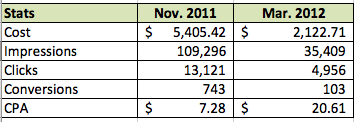The holidays are rapidly approaching, starting with the one-two punch of Black Friday and Cyber Monday in a mere two weeks. I hope you’re ready, because every single ecommerce site in the world certainly is. So what can you do with your keywords to help your account keep up with the holiday rush?
Have you ever tried to bid on the term “gifts” alone? It’s dumb. Don’t do it. If you qualify it with long-tail keywords, though, you can capture a bigger slice of the holiday audience. Generating those long-tail keywords is easy. In fact, we already showed you how to do that last year. The real question is this: should you do it?
Here’s a small case study. We recently took on an ecommerce client dedicated to novelty and gag items – perfect gift material, and November is their biggest month of the year by far. Let’s take a look at their overall statistics for November 2011.

With a total of 6,854 queries last November, they had 180,040 impressions, 18,959 clicks, and 940 conversions. Many of their primary keywords are based around the use of long-tail keywords containing the term “gift” – gag gifts, funny gifts, fart perfume gifts, gifts for him, that sort of thing. Consider adding those in for your product categories using “gift” or “present” as a modifier to capture some of that holiday traffic. If you don’t actually have fart perfume gifts, you might want to abstain from that one.
Where it gets interesting, though, are the holiday-specific queries. In this case, we’ll take a look at a few different phrases that you might consider adding to a product list for new holiday keywords. For this client, they’re: “Christmas”, “stocking stuffer”, “xmas”, and “secret santa”.

Now, there is some overlap – they all deal with the same holiday, after all. However, it’s clear that the addition of both “Christmas” and “stocking stuffer” terms drove a significant portion of conversion volume, even on top of the usual “gift” keywords used in the account.
This does come with the caveat of an increase in cost and overall CPA – mostly due to competition. The average cost per click on the holiday-specific terms in this case was $0.56, compared to only $0.41 for the non-holiday gift terms. However, as an ecommerce client you should be managing to overall ROI instead of flat CPA, and in this case the keywords generated far more than the total spent on them. As always, it’s up to you to make the call.
What’s interesting is that when you remove all instances of “Christmas”, “stocking stuffer”, “xmas”, and “secret santa”, you’re left with the following results:

I’ve left the overall statistics in there as well for the sake of comparison – because who wouldn’t appreciate a 27% higher conversion volume? It may not work for every client, or even every holiday, but for this particular client the use of holiday terms was a great boon to their bottom line.
But what about the “Gift” keywords by their lonesome? Let’s take a look at data from March of this year – without any keywords concerning major holidays, just on their own. I’ve removed data from queries containing “Christmas”, “xmas”, “stocking stuffer”, and “secret santa” for an apples-to-apples comparison. Here are the results:

Overall impressions and costs were down in March due to the natural ebb and flow of holiday ecommerce, but what’s really interesting to note is the increase in CPA on the exact same terms from November to March. For this particular client, returns on “gift” terms were obviously much higher during the holidays.
The main takeaway from this data point is this: if you’re in the business of things that can be given as gifts, advertise for gifts during the holidays! The increased interest and gift-giving goodwill that comes with the holiday season provides you an opportunity for stellar conversion rates, along with great returns on your advertising spend.
As with any keyword addition, be judicious with your use of negatives. For “Christmas gift” alone, you’re going to want to exclude tags, guides, baskets, wrap, quiz, recipes, boxes, and surprisingly “The Christmas Gift” (both a book AND a movie, starring John Denver no less).
The same can be said for Black Friday and Cyber Monday advertising – the returns are there, just be wary of phrase matching to “Black Friday” and “Cyber Monday” deals alone. You risk getting swallowed up by Amazon, Wal-Mart, Target, and Best Buy in their bid to capture holiday shoppers. Make sure you qualify those terms with your product category!
What about your experience with holiday terms? Are they different than the case presented above? Have your holiday keyword additions led to a Happy New Year? Let us know in the comments, and as always – thanks for reading!



